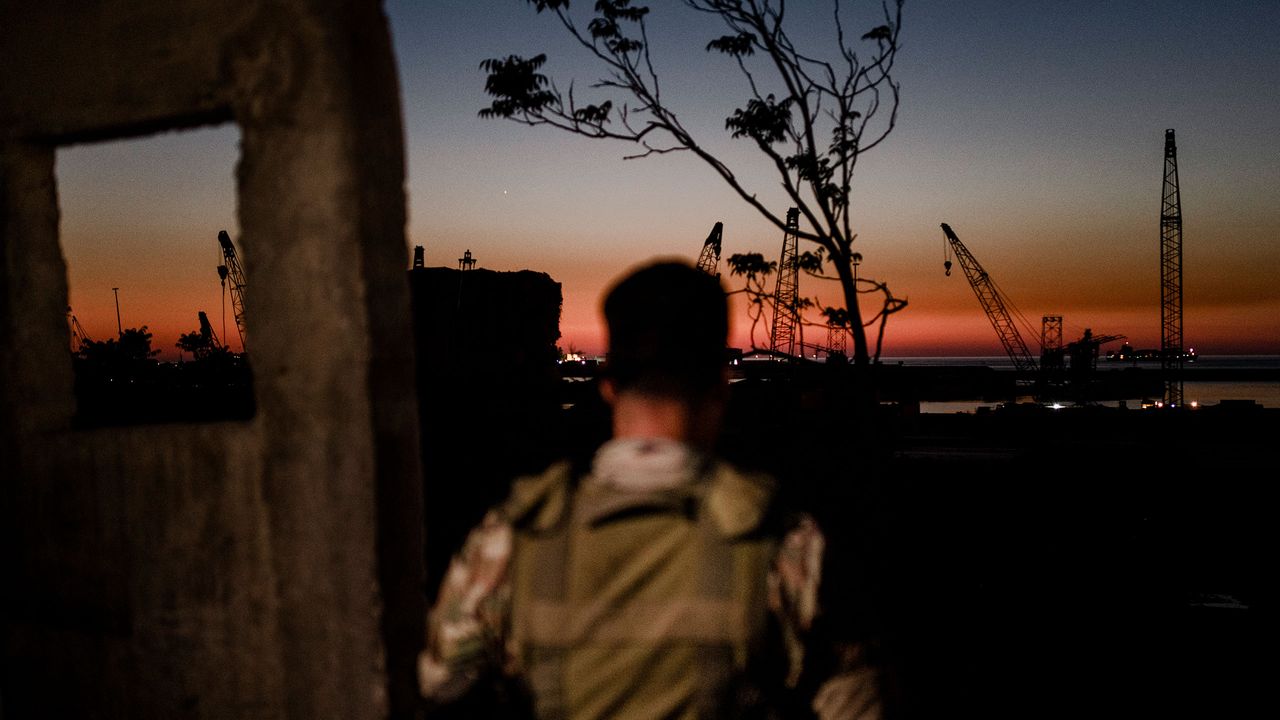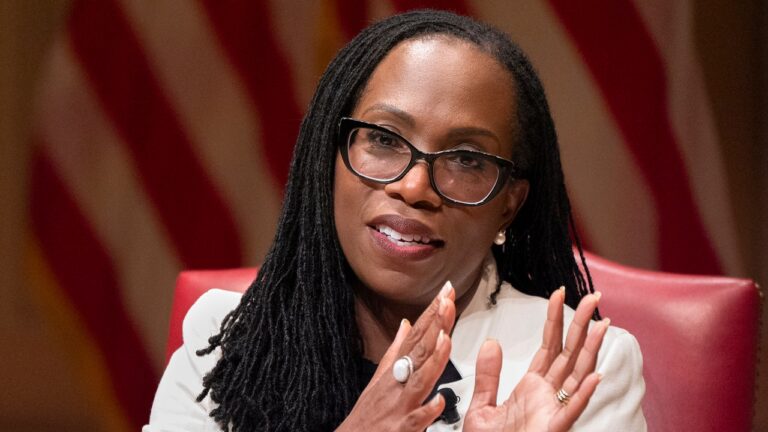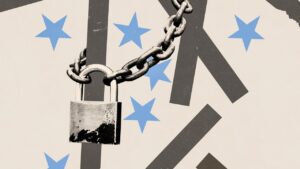In late February, Nawaf Salam, the Prime Minister of Lebanon, travelled to the country’s south to survey the devastation wrought by the recent war between Hezbollah and Israel. It was Salam’s second day on the job. He pledged to rebuild the area, which had incurred billions of dollars’ worth of damage. Salam also promised to strengthen the Lebanese Armed Forces, as a means to assert the state’s authority in a place that for years had been under the sway of Hezbollah.
The people of the south had messages for the Prime Minister, too. During a walk through the city of Nabatieh, a man carrying a toddler pushed through Salam’s thick security cordon. “The first word that should be said is ‘thank you’ to the resistance,” he yelled, referring to Hezbollah. Salam had earlier lauded the Lebanese Army and UNIFIL, the United Nations peacekeeping force stationed along the border with Israel, the man noted approvingly, but not “the blood of the martyrs of the resistance. Are you afraid of America? Afraid that the U.S. Ambassador will be upset with you?” Salam did not respond.
In November, 2024, after thirteen months of war that killed more than four thousand Lebanese and a hundred and twenty Israelis, Hezbollah and Israel reached a ceasefire. (Decades-old hostilities between the two foes had reignited on October 8, 2023, when Hezbollah attacked Israel a day after Hamas’s surprise offensive from Gaza.) But Israeli forces continue to occupy five hilltops in southern Lebanon, in violation of the agreement. In the border village of Khiam, near Tallet al-Hamames, one of the hilltops, a man in a black baseball cap, standing inches from the Prime Minister, suggested that the state was powerless to recover the territory through negotiations, which “never produce results.” Instead, he said, “we will reclaim our land through resistance.”
“We are resistance, resistance, resistance!” a woman in a black hijab said, pinching her fingers in Salam’s face to stress every word. “The people, the Army, and the resistance, until the last drop of blood!” she added. It was a security formula that had been adopted by successive governments since the end of Lebanon’s sectarian civil war, in 1990, when the country’s militias were disbanded—with the exception of Hezbollah, because it was engaged in battle against the Israeli occupation of southern Lebanon. Hezbollah’s armed wing was dubbed “the resistance.” The group’s politicians entered the Lebanese parliament. (In 2000, Hezbollah pushed Israel out of all but a sliver of the south, which Israel still occupies.)
Salam’s cabinet manifesto was the first in more than three decades to contain no mention of “the resistance.” It emphasized the state’s responsibility to defend all of its territory and to hold a monopoly on weapons. General Joseph Aoun, the former commander of the armed forces, who in January was elected the country’s new President, made the same points in his inaugural address. Neither Aoun nor Salam was Hezbollah’s preferred candidate—they were both seen as Western-friendly reformers—but Hezbollah’s parliamentarians voted for the President and in support of the new government, which includes several Hezbollah-affiliated ministers. For more than two years, Lebanon had gone without a President or a fully empowered government, both of which would be necessary to begin reconstruction.
The ceasefire agreement stipulates that Hezbollah pull back to north of the Litani River, which cuts across southern Lebanon, about thirty kilometres from the frontier with Israel, and that Israeli forces withdraw to their side of the border, allowing Lebanese troops to dramatically increase the size of their deployments in the area. Israel has now violated two withdrawal deadlines. The day before Salam’s tour, Israel Katz, Israel’s Minister of Defense, said that his forces would indefinitely occupy what he called a “buffer zone” in southern Lebanon. “We received a green light from the United States,” he said. “We gave them a map.” Israel’s Prime Minister, Benjamin Netanyahu, has reiterated that his troops “will not relinquish control” of the five hilltops. Hezbollah’s presence is harder to measure but, “in terms of activities, we don’t see any,” Andrea Tenenti, the spokesperson for UNIFIL, told me.
Israel continues to strike targets, including in the capital, Beirut, that it claims are Hezbollah infrastructure and personnel, in near-daily air and drone strikes. Israeli troops have engaged in controlled detonations to raze entire villages, destroying homes, orchards, and public utilities, taking more territory during the ceasefire than they were able to during the war. By mid-April, the Lebanese state had registered more than twenty-seven hundred Israeli attacks, and said that a hundred and ninety people, including civilians, had been killed, and almost five hundred wounded, since hostilities supposedly stopped. Hezbollah carried out one post-ceasefire attack, on December 2nd, targeting an Israeli military post in occupied Lebanese territory, which resulted in no casualties. The group denied involvement in two other amateurish rocket strikes.
Lebanon’s Ministry of Foreign Affairs has filed a complaint against Israel with the U.N. Security Council. A joint U.S. and French-led ceasefire-monitoring mechanism has not called out any breaches of the truce and, according to Tenenti, the monitors have not even defined “what’s a violation and what isn’t.” The ceasefire agreement, he told me, is vague and can be interpreted as “saying that for any threat to the security of Israel or perceived threat, they will strike against the target.” Morgan Ortagus, the deputy U.S. special envoy for the Middle East, has been quick to call out the few rockets fired from Lebanon and claim that Israel has a right to respond to them. She has not commented on Lebanon’s rights and is pushing authorities in Beirut to disarm all armed groups, including Hezbollah—south and north of the Litani.
Many Lebanese have long blamed Hezbollah for usurping decisions of war and peace from the hands of the government. Some accuse it of being a state within a state, pursuing an independent foreign policy in service of its patron, Iran. Domestic calls for its disarmament are rising. Hezbollah’s secretary-general, Sheikh Naim Qassem, has said that his party won’t give up its arms in the face of continued Israeli aggression. In his first interview with Hezbollah’s Al-Manar television station, in early March, he said that he supports the President’s view that the state should have a monopoly on weapons—but insisted that “if anyone thinks the President’s words were directed at us, we don’t see it that way.” Hezbollah, he went on, was “giving the state the full opportunity to engage diplomatically, so that we can prove to the whole world that this is Israel, which will only withdraw and can only be understood through weapons.” The onus was on the Lebanese state, he said. “Show us: What can you do against this enemy?”
The Lebanese Army was not an active combatant in the recent war with Israel. That didn’t mean, however, that it didn’t sustain casualties. Nineteen soldiers were killed while on duty during the war, and another twenty-eight died in their homes. More than a hundred and seventy were wounded. The Lebanese military returned fire in self-defense less than a handful of times.
In a country riven by sectarianism, the military is the one state institution that commands broad respect, in part because it is considered politically neutral and is made up of such a wide cross-section of the population (although the position of commander of the armed forces is reserved for a Maronite Christian). Lebanese soldiers on duty are routinely greeted with the phrase “ya watan,” meaning “the nation.”
As a fighting force, however, the Army is considered weaker than Hezbollah, both in terms of its hardware and its manpower: about seventy-five thousand soldiers versus Hezbollah’s prewar claims of a hundred thousand. During the war, Hezbollah suffered significant losses, which the organization’s leadership admitted were “painful” and “unprecedented.” Much of the Party’s upper echelon was assassinated, including its long-tenured secretary-general, Sayyed Hassan Nasrallah. It is difficult to gauge the degree of damage to its weapons stockpiles, given the clandestine nature of the group. Any claims are speculative. Hezbollah launched long-range missiles and armed drones that pierced Israel’s Iron Dome defenses and reached as far south as Tel Aviv. It downed Israeli drones and compelled other aircraft to retreat from southern skies. The Lebanese military, on the other hand, has antiquated equipment and no serious air defenses. Since 2019, when Lebanon’s currency and economy collapsed, the state has struggled to pay salaries, forcing many soldiers to quietly take up part-time jobs. In 2022, Qatar donated funds to help supplement military salaries. The U.S. pitched in the following year.
Last year, I spoke with General Chamel Roukoz, the former commander of the Rangers Regiment, the Army’s commando unit, in his office north of Beirut. Roukoz, who retired in 2015, carries himself with the bearing of a lifelong military man. He was once touted as a possible commander of the armed forces, but his nomination was opposed by Hezbollah, among others, he said. At the time of our meeting, Hezbollah was engaged in ferocious clashes with Israeli ground troops, and Israeli ministers were threatening to reoccupy southern Lebanon. I asked Roukoz what might stop them. “Hezbollah,” he said. “Who else is standing in their way? It’s not because I like them, but they are Lebanese, fighting for Lebanese land, for their homes and villages.”
Roukoz lamented that the Lebanese Army was unable to do the same. Since 2006, the Army has been bankrolled and supplied by the West, which has steered it toward counterterrorism operations and initiatives to secure the country’s borders against the smuggling of weapons and other contraband. The Army also often acts like a police force, deployed during protests to keep the peace. The United States has provided more than three billion dollars’ worth of assistance, including equipment such as Humvees, grenade launchers, small arms, night-vision goggles, and body armor. The European Union supplies only nonlethal equipment. This reliance on foreign aid comes with constraints. Lebanon has been left “weak against the Israelis,” Roukoz told me. “There is no way the Americans will give us weapons and allow us to use them against Israel. Remember the incident with the tree?”
In August, 2010, there was a brief firefight between the Lebanese and Israeli Armies, in what came to be known as the “tree incident.” It remains the most serious, direct confrontation between the two militaries. Israeli troops had cut down a tree in Lebanese territory which was obscuring their view, prompting a Lebanese soldier to fire warning shots, an encounter that spiralled into clashes. An Israeli officer, two Lebanese soldiers, and a journalist were killed. At the time, the U.S. had already suspended a hundred million dollars in military aid to Lebanon, citing concerns over “reported Hezbollah influence” on the Army. The freeze was maintained while an investigation determined “whether equipment that the United States provided to the Lebanese Armed Forces was used against our ally, Israel.” Elias Murr, Lebanon’s Defense Minister, responded furiously. “Those who want to help the Army on condition that it doesn’t protect its territory, people, and border from Israel should keep their money—or give it to Israel instead,” he said. The U.S. restored aid three months later, but the message was clear: engage Israel at your peril.
In the nineteen-sixties, Lebanon had explored an attempt at self-reliance. Haigazian University, in Beirut, produced the Arab world’s first indigenous rockets, as part of a pioneering space program. The military, recognizing the technology’s potential, became involved, but after six years the Cedar Rockets project ended, a development that many Lebanese attribute to Western pressure. Lebanon has always been beholden to foreign military suppliers: first to Russia, whose Syrian allies dominated Beirut after the end of the Lebanese Civil War, and then, after the Syrians withdrew in 2005, to the United States. In 2008, Lebanon tried to diversify by going back to the Russians, who offered to donate ten MIG-29 fighter jets, more than seventy tanks, and tens of thousands of rounds of ammunition, but, according to a handful of diplomatic cables published by WikiLeaks, Americans scuttled the deal. Another cable from the same period outlined how the U.S. urged the Lebanese Army to destroy its Russian-made anti-aircraft missiles, even while recognizing “that the armed forces would be giving up control of a valuable air defense weapon, a concern highlighted by daily overflights of Israeli military aircraft.”
Last year, in late October, Emmanuel Macron, the President of France, sponsored an international conference in Paris to support Lebanon. It raised a billion dollars: eight hundred million in humanitarian aid and two hundred million to support the country’s security forces, including the Army. That was “enough to buy fuel for vehicles,” Major General Abbas Ibrahim, the former national-security chief, told me at the time. “If you want to arm an Army, you have to talk about billions.” (In 2016, a three-billion-dollar weapons package from France and Saudi Arabia was cancelled because of concerns about Hezbollah’s alleged influence.) Empowering the Army, Ibrahim said, would weaken Hezbollah’s claim that it counters Israeli threats the state can’t address on its own. At the top of his list were air-defense and antitank equipment. He supported the convening of a domestic political conference to formulate a national defense strategy, which would include determining the future of Hezbollah’s arsenal. Roukoz, the former Rangers commander, told me that he believes Hezbollah should negotiate handing over its weapons to the Lebanese Army “to unite our strengths.” (He pointed out that the U.N. Security Council Resolution 1701, which ended a previous war with Israel, in 2006, stated that “there will be no weapons without the consent of the Government of Lebanon and no authority other than that of the Government of Lebanon.”)
Both generals cautioned against forcibly disarming Hezbollah. It is “a very dangerous game to play,” Ibrahim warned. (In the civil war, Army brigades sometimes fragmented along sectarian lines when tasked with fighting sectarian militias.) In mid-April, President Aoun announced that he would hold bilateral talks with Hezbollah to discuss the future of its arsenal, saying that “the decision has been made to place all weapons under the state.” In an interview with Al-Araby Al-Jadeed, a pan-Arab media outlet, Aoun, referring to U.S. demands to disarm Hezbollah, said, “We want to remove Hezbollah’s weapons, but we will not ignite a civil war in Lebanon,” adding that the U.S. should instead pressure Israel to withdraw from Lebanon and “let us negotiate with Hezbollah, and give us the space to work.” Qassem, Hezbollah’s leader, said in a televised speech that he welcomed dialogue about a national defense strategy, but that the idea of disarmament “must be removed from the dictionary.” He emphasized that Israel first needed to fully withdraw from southern Lebanon and keep its air force out of the country’s skies. Otherwise, he said, it “is not considered a discussion” but “a surrender.”
UNIFIL’s headquarters, in Naqoura, on the southernmost tip of Lebanon, sits along a serene stretch of the Mediterranean that abuts spectacularly verdant mountains. Since the ceasefire, the peacekeepers have resumed joint border patrols with the Lebanese Army. UNIFIL is involved in removing rubble and unexploded ordnance, helping the Lebanese military deploy in areas vacated by Israeli forces, and facilitating humanitarian assistance from the U.N. and other agencies. The joint patrols have also uncovered bunkers, and more than two hundred and twenty-five weapons caches belonging to Hezbollah and other armed groups. The Lebanese military says that it has dismantled more than ninety per cent of Hezbollah’s infrastructure south of the Litani River.
Tenenti, the UNIFIL spokesperson, was worried that the conflict could reignite if Israel continues its strikes. The Lebanese Army, he said, must be given “strong support” to stamp the state’s authority along the border and be provided with the financial means and capabilities to do so by the international community. I pointed out that historically this hasn’t been the case. He agreed, but felt that the nature of the latest chaos—how close things seemed, for a time, to boiling over into a much larger regional war—might have created “a different mind-set to try to solve this issue.”
I continued on from UNIFIL’s headquarters to Kfar Kila, a village along the border with Israel, but was stopped near its entrance by a lone Lebanese Army Humvee. Two bored-looking soldiers were blocking the road with coiled razor wire. Steps away, Abdullah Fares, who is sixty years old, was welding rods of metal beside the remains of a four-story building that he owned—it once consisted of eight apartments and ten stores. He was there with his brother Mohammad. Nearby were piles of cinder blocks that were part of the pair’s construction business. What pained him the most, Abdullah said, was that his building survived the war and was demolished in February, months into the ceasefire. Their homes in the village were also destroyed after the war. “Kfar Kila is wiped out,” Abdullah said. Mohammad added, “There isn’t even a tree still standing, let alone a house. It’s all been bulldozed.”
The night before I arrived, an Israeli helicopter had destroyed three mobile homes set up as shelters by residents in Kfar Kila. This continues to happen in towns along the frontier. The brothers said that they wouldn’t dare use the cinder blocks around them to rebuild anything. “There is no ceasefire,” Abdullah said. “What a joke.” He’d lost about a million dollars’ worth of assets, he told me, not counting the incalculable, including an olive tree that he’d inherited from his grandfather. Neither Hezbollah nor the state had come to survey the extensive damage, although Hezbollah had given Abdullah and others who had lost their homes between twelve thousand to fourteen thousand dollars apiece, part of what the group’s leader called a gift from Iran. “My kitchen cost more than that,” Abdullah said. “Forty-five years of hard work and there’s nothing left.”
Abdullah stressed that he wasn’t with “Hezbollah or any party,” but that if the Israelis didn’t leave, “I will be forced to resist, to fight and die for our land. We have nothing left to lose, and if we are killed so be it.”
The nearby soldiers weren’t a reassurance, the brothers told me. “We see that the Israelis can enter whenever they want, strike whenever they want, and the Army and UNIFIL are watching them,” Mohammad said. “The other day, a drone dropped an explosive near us while we were tending our sheep. How are these soldiers stationed here protecting me?” ♦








